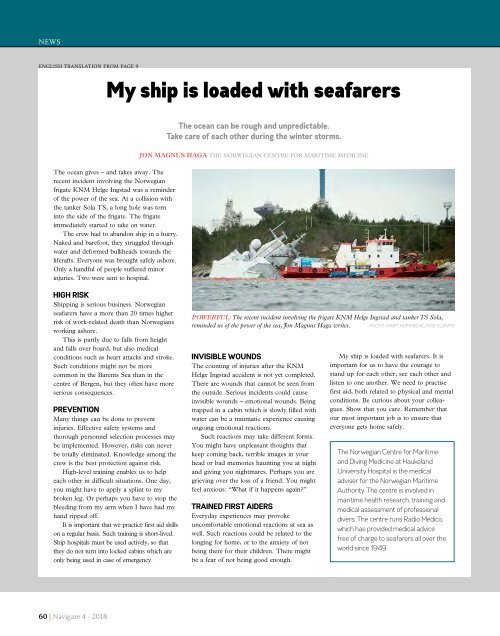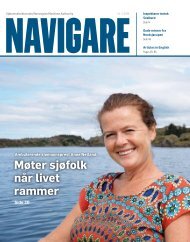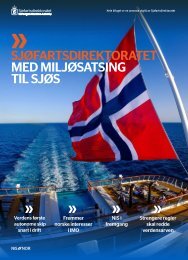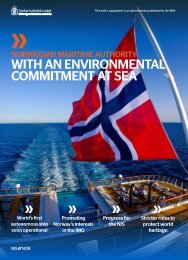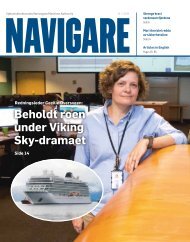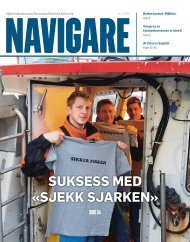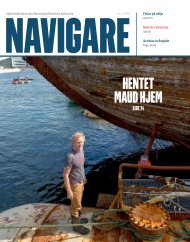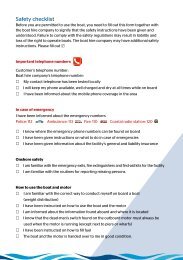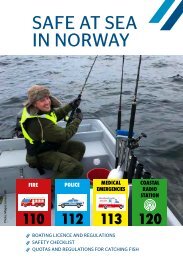You also want an ePaper? Increase the reach of your titles
YUMPU automatically turns print PDFs into web optimized ePapers that Google loves.
NEWS<br />
ENGLISH TRANSLATION FROM PAGE 9<br />
My ship is loaded with seafarers<br />
The ocean can be rough and unpredictable.<br />
Take care of each other during the winter storms.<br />
The ocean gives – and takes away. The<br />
recent incident involving the Norwegian<br />
frigate KNM Helge Ingstad was a reminder<br />
of the power of the sea. At a collision with<br />
the tanker Sola TS, a long hole was torn<br />
into the side of the frigate. The frigate<br />
immediately started to take on water.<br />
The crew had to abandon ship in a hurry.<br />
Naked and barefoot, they struggled through<br />
water and deformed bulkheads towards the<br />
liferafts. Everyone was brought safely ashore.<br />
Only a handful of people suffered minor<br />
injuries. Two were sent to hospital.<br />
JON MAGNUS HAGA THE NORWEGIAN CENTRE FOR MARITIME MEDICINE<br />
HIGH RISK<br />
Shipping is serious business. Norwegian<br />
seafarers have a more than 20 times higher<br />
risk of work-related death than Norwegians<br />
working ashore.<br />
This is partly due to falls from height<br />
and falls over board, but also medical<br />
conditions such as heart attacks and stroke.<br />
Such conditions might not be more<br />
common in the Barents Sea than in the<br />
centre of Bergen, but they often have more<br />
serious consequences.<br />
PREVENTION<br />
Many things can be done to prevent<br />
injuries. Effective safety systems and<br />
thorough personnel selection processes may<br />
be implemented. However, risks can never<br />
be totally eliminated. Knowledge among the<br />
crew is the best protection against risk.<br />
High-level training enables us to help<br />
each other in difficult situations. One day,<br />
you might have to apply a splint to my<br />
broken leg. Or perhaps you have to stop the<br />
bleeding from my arm when I have had my<br />
hand ripped off.<br />
It is important that we practice first aid skills<br />
on a regular basis. Such training is short-lived.<br />
Ship hospitals must be used actively, so that<br />
they do not turn into locked cabins which are<br />
only being used in case of emergency.<br />
POWERFUL: The recent incident involving the frigate KNM Helge Ingstad and tanker TS Sola,<br />
reminded us of the power of the sea, Jon Magnus Haga writes. PHOTO: MARIT HOMMEDAL/NTB SCANPIX<br />
INVISIBLE WOUNDS<br />
The counting of injuries after the KNM<br />
Helge Ingstad accident is not yet completed.<br />
There are wounds that cannot be seen from<br />
the outside. Serious incidents could cause<br />
invisible wounds – emotional wounds. Being<br />
trapped in a cabin which is slowly filled with<br />
water can be a traumatic experience causing<br />
ongoing emotional reactions.<br />
Such reactions may take different forms.<br />
You might have unpleasant thoughts that<br />
keep coming back, terrible images in your<br />
head or bad memories haunting you at night<br />
and giving you nightmares. Perhaps you are<br />
grieving over the loss of a friend. You might<br />
feel anxious: “What if it happens again?”<br />
TRAINED FIRST AIDERS<br />
Everyday experiences may provoke<br />
uncomfortable emotional reactions at sea as<br />
well. Such reactions could be related to the<br />
longing for home, or to the anxiety of not<br />
being there for their children. There might<br />
be a fear of not being good enough.<br />
My ship is loaded with seafarers. It is<br />
important for us to have the courage to<br />
stand up for each other, see each other and<br />
listen to one another. We need to practise<br />
first aid, both related to physical and mental<br />
conditions. Be curious about your colleagues.<br />
Show that you care. Remember that<br />
our most important job is to ensure that<br />
everyone gets home safely.<br />
The Norwegian Centre for Maritime<br />
and Diving Medicine at Haukeland<br />
University Hospital is the medical<br />
adviser for the Norwegian Maritime<br />
Authority. The centre is involved in<br />
maritime health research, training and<br />
medical assessment of professional<br />
divers. The centre runs Radio Medico,<br />
which has provided medical advice<br />
free of charge to seafarers all over the<br />
world since 1949.<br />
60 | <strong>Navigare</strong> 4 - <strong>2018</strong>


